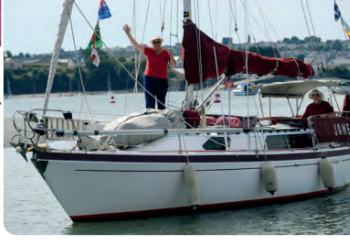Câu hỏi 1
101
SPEAKING Describe the photo in pairs. What would be the best and worst things about going on a long trip on a boat like this?

Gợi ý
Mô tả bức ảnh theo cặp. Điều tốt nhất và tồi tệ nhất khi thực hiện một chuyến đi dài trên một chiếc thuyền như thế này là gì?
Đáp án
- The picture shows the two men are enjoying a boat trip on a sunny day. One of the men is sitting down while the other one is standing and waving his hand, suggesting a feeling of joy and excitement. The boat is quite big and painted white, which could indicate that it is a tourist boat or a private boat owned by someone who enjoys sailing as a hobby. Overall, the photo depicts a pleasant and relaxing scene on the water.
(Bức ảnh cho thấy hai người đàn ông đang tận hưởng chuyến du ngoạn trên thuyền vào một ngày nắng đẹp. Một trong hai người đàn ông đang ngồi trong khi người kia đang đứng và vẫy tay, gợi cảm giác vui vẻ và phấn khích. Chiếc thuyền khá lớn và được sơn màu trắng, điều này có thể cho thấy đây là thuyền du lịch hoặc thuyền tư nhân của một người thích chèo thuyền như một sở thích. Nhìn chung, bức ảnh mô tả một cảnh thú vị và thư giãn trên mặt nước.)
- A long boat trip can be an enjoyable and adventurous experience, with opportunities to appreciate stunning scenery, relax in a peaceful environment, explore new destinations, and bond with travel companions. However, the trip can also present some challenges, including the possibility of seasickness, limited living and sleeping space, unpredictable weather, and limited access to amenities like restaurants and medical facilities.
(Một chuyến đi dài bằng thuyền có thể là một trải nghiệm thú vị và mạo hiểm, với cơ hội chiêm ngưỡng phong cảnh tuyệt đẹp, thư giãn trong môi trường yên bình, khám phá những điểm đến mới và gắn kết với những người bạn đồng hành. Tuy nhiên, chuyến đi cũng có thể mang đến một số thách thức, bao gồm khả năng bị say sóng, không gian sinh hoạt và ngủ nghỉ hạn chế, thời tiết khó lường và khả năng tiếp cận các tiện nghi như nhà hàng và cơ sở y tế hạn chế.)


